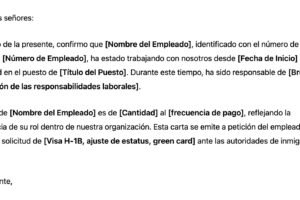Migration Approval Letter: What is it and how to write it correctly?

When you are in an immigration process in the United States, the immigration approval letter is one of the most awaited documents.
This official document, issued by the U.S. Citizenship and Immigration Services (USCIS), confirms that your application has been approved and brings you closer to regularizing your status, either through a work visa, adjustment of status, or obtaining permanent residency (green card).
In addition, there are other types of letters related to the immigration process that are essential, such as letters of support, which can help you in specific situations such as release on bond or relief from deportation.
This article is directed especially to Guatemalans living in the United States who need to better understand what the immigration approval letter is, how it is used, and what other types of letters may be needed in their process.
What is a migration approval letter
The immigration approval letter is the document issued by USCIS that certifies that your application has been approved, allowing you to move forward in your process. Depending on the type of application filed (permanent residence, work visa, adjustment of status or employment permits), you will receive this letter to inform you of the next steps to take.
For example, if you are applying for a green card, this letter may include additional instructions on submitting biometric documents, interviewing or receiving your green card. If you have applied for a work visa, it may provide details on the process for receiving your employment authorization document (EAD).
- More information on biometric data in immigration proceedings: USCIS – Biometric Data
How to write a letter of support for immigration
On many occasions, a family member, friend or acquaintance may ask you to write a letter of support for his or her immigration case. This type of letter is essential in certain cases, such as when you are requesting release on bond, relief from deportation, or any other form of immigration relief.
The purpose of this letter is to support the applicant by providing key information about his or her behavior, family or community ties, and why he or she deserves to be favored by the immigration court system.
Letter of support for release on bail
When someone is detained by Immigration and Customs Enforcement (ICE), they can request a hearing to be released on bond.
At this hearing, the judge will consider several factors, such as the detainee’s ties to the community, whether he or she poses a risk to society, and whether there is a possibility that he or she will continue his or her immigration proceedings in a responsible manner. Your letter can help demonstrate that the detained person does not pose a risk and is likely to return to his or her hearings in the future.
Steps for writing a letter of support for bail:
- Address the letter to the “Honorable Immigration Judge.”
- Introduce yourself, state your relationship to the detainee and explain how long you have known the detainee.
- It details the person’s participation in the community, his or her positive behavior and the negative effects that his or her detention has on his or her family.
- Explain why you believe he is not a danger to society and why you expect him to return to court.
- It ends with a sentence such as: “I swear that the foregoing is true and correct to the best of my knowledge and belief”.
- Sign the letter and, if you can, include a copy of your identification showing your status as a legal resident or U.S. citizen.
- More information on bail bond procedures: ICE – Bail Bond Procedures
Letters of support in deportation cases
Another common type of support letter is used in waivers of deportation or cancellation of removal proceedings. These letters are key to demonstrating that the applicant’s deportation would cause exceptional hardship to close relatives who are U.S. citizens or permanent residents. Judges especially consider how deportation would affect “qualifying relatives,” i.e., those who are closely related to and dependent upon the applicant.
Key factors to include in a letter of support for deportation
- Health problems: If the qualifying relative suffers from a serious medical condition that would worsen without the applicant’s support, this is an important factor that should be detailed in the letter.
- Economic consequences: Explain how the applicant’s deportation would affect the economic stability of the family, especially if he/she is the primary income provider.
- Vulnerability of family members: If the qualifying relative is a minor or has special educational needs, it highlights how deportation would affect their development and well-being.
- Conditions in the country of origin: If the applicant’s country of origin has dangerous or unsuitable conditions for medical care or education, this is a crucial point to include in the letter.
Example of a situation in a letter of support
Andres, a Guatemalan resident in the U.S., is in deportation proceedings. His wife, a U.S. citizen, has kidney failure and requires weekly dialysis. Andres is her primary caregiver and also financially supports his family.
If Andres were deported, his wife would be left without both financial and emotional support, and there would be no one to care for their young children. In addition, in Guatemala, his wife would not have access to the medical care necessary to continue her treatment. These details should be explained in the letter, highlighting the gravity of the situation.
How to structure an effective letter of support
For your letter of support to have a positive impact, it must follow a clear and logical structure. Here are some steps to follow:
- Introduction: Begin by introducing yourself, indicating your relationship with the applicant and how long you have known him/her.
- Specific Hardship: Detail the exceptional hardship that qualifying relatives would face if the applicant were deported or did not receive the requested immigration relief. Use specific examples.
- Contribution to the community: Mention if the person has contributed in a significant way to his/her community or family, either through work, volunteering or any other activity.
- Formal Closing: End with a statement such as “I swear that the foregoing is true and correct to the best of my knowledge and belief,” then sign and date the letter.
- A Guide to Writing Letters of Support: Michigan Immigrant Rights Center
Migration approval letters and letters of support play an essential role in the migration process.
While the immigration approval letter gets you closer to regularizing your status, letters of support can make a significant difference in cases of deportation, adjustment of status, or release on bond. If you are asked to draft a letter of support, it is critical that you focus on specific details that show the hardship the applicant’s family would face.
For those Guatemalans living in the U.S., it is important to stay informed about immigration requirements and know that while these processes can be long and complicated, having the right documents and support can make all the difference in the success of your case.






